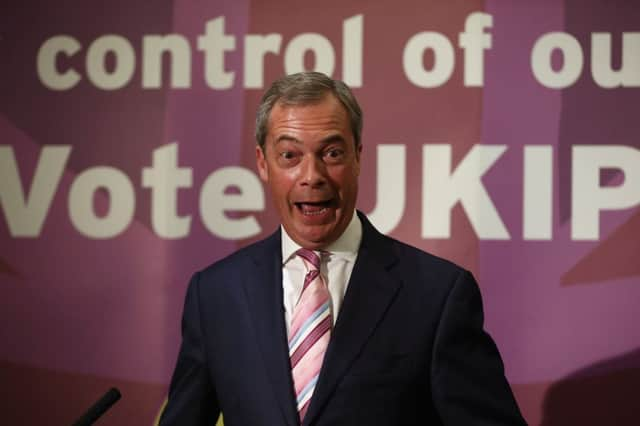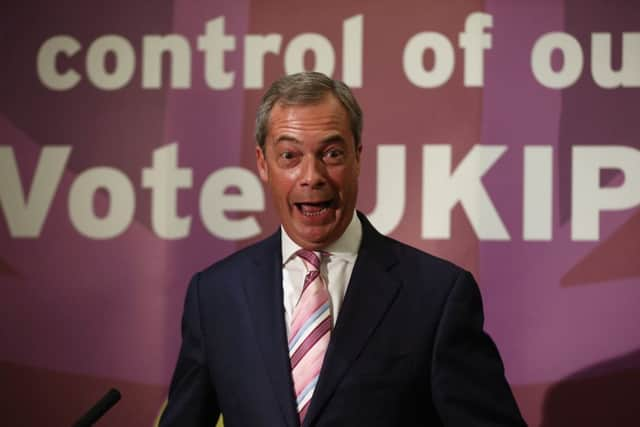Voting SNP keeps Ukip out of Scotland, urges Ewing


The matriarch of the SNP’s best-known dynasty made her first intervention in the European parliamentary election campaign when she urged voters to vote SNP to keep out the anti-immigration party.
Opinion polls have suggested Ukip’s chances of winning a Scottish seat might depend on whether the SNP manages to increase its European representation from two seats to three. On that basis, Alex Salmond’s party has argued that the electorate faces a straight choice between the SNP and Nigel Farage’s party.
Advertisement
Hide AdAdvertisement
Hide AdMrs Ewing, 84, the heroine of the 1967 by-election who was known as Madame Ecosse when she sat in the European Parliament, lent her support to Tasmina Ahmed-Sheikh, the candidate hoping to join the SNP’s Ian Hudghton, 62, an MEP since 1998, and Alyn Smith, 40, an MEP since 2004.


“As the SNP’s first woman parliamentarian – and the party’s first ever Euro-MP – I fervently hope that Tasmina will become our newest in Thursday’s election,” Mrs Ewing said.
“It is very clear that the choice is between Tasmina Ahmed-Sheikh and Nigel Farage’s Ukip for Scotland’s sixth seat, and I am in no doubt that the vast majority of people in Scotland – regardless of how they might vote in other elections – would prefer the progressive politics and forward-looking vision of Tasmina.
“If elected, Tasmina will be a strong voice for Scotland and the many diverse communities which make up our modern nation. I urge people to vote for her on Thursday.”
Ms Ahmed-Sheikh said: “If I am elected on Thursday I am determined to follow in Winnie Ewing’s footsteps by being a strong voice for Scotland in Europe and standing up for the needs and priorities of people in Scotland at every turn.”
Six seats in Scotland are up for grabs.
The SNP is expected to emerge as the largest party, with Mr Hudghton and Mr Smith being returned to the European Parliament.
Labour’s sitting MEPs David Martin and Catherine Stihler are also expected to be elected.
George Lyon, of the Lib Dems, faces a struggle to be returned to the European parliament.
Advertisement
Hide AdAdvertisement
Hide AdAnd Ukip could eat into Conservative support for Dr Ian Duncan, who is hoping to replace Struan Stevenson as the party’s European representative.
A rise in Ukip support could also thwart the SNP’s ambitions to win a third seat for Ms Ahmed-Sheikh, a mother of four who is a past winner of Scotland’s Asian businesswoman of the year award.
The polls would suggest Ukip faces an uphill battle to secure that 12 per cent of the vote that would put it within sight of Strasbourg.
But the SNP is taking no chances, launching a series of attacks on Mr Farage’s party.
Should Ukip upset the odds and return David Coburn, the candidate at the top of its list in Scotland, it would be a blow to the SNP’s narrative that Scotland and England are travelling down diverging political paths.
Opinion polls suggested Ukip is in line to be the largest party south of the Border, beating Labour and the Conservatives into second and third place respectively.
A series of gaffes have marred Mr Farage’s campaign, including a radio interview in which he struggled to explain why he felt “uncomfortable” hearing foreign languages on trains.
Yesterday, the last TNS poll before the European elections showed that Ukip is leading Labour by three points UK-wide ahead of tomorrow’s vote.
Advertisement
Hide AdAdvertisement
Hide AdAccording to TNS, the recent negative coverage of Ukip and Nigel Farage seems to have had an impact and the projected vote share for Ukip has fallen by five points from 36 per cent to 31 per cent since 30 April. Labour is second on 28 per cent, with the Tories in third place with 21 per cent – up three points since April.
The Liberal Democrats are a distant fourth, with 7 per cent.
Yesterday, Mr Salmond stepped up his attacks on Ukip when he responded to a claim by Mr Coburn that the First Minister had been using “sectarian” campaign tactics.
Mr Coburn’s comment was made after Mr Salmond visited a mosque on the election trail last week. Mr Coburn claimed that if he had made a similar visit to a venue such as a Roman Catholic cathedral, he would have faced the same accusation.
Mr Salmond said: “Attacking a visit to a mosque illustrates perfectly why it is so important that we stop Ukip in their tracks – and we have that opportunity in Scotland on Thursday.
“The diversity of modern Scotland is a strength and a source of enrichment to our whole society. It is something to be celebrated – as we do across the political spectrum in Scotland – and is the antithesis of the backward-looking, insular and intolerant politics of Ukip.”
Last night, Mr Coburn said: “Scotland has been plagued with sectarianism as we all know and we have done our best to avoid any of that nonsense, and we have steered clear of any houses of religion. Quite frankly, it is not an appropriate place to be recruiting.”
ANALYSIS
John Curtice: Voters face choice between SNP and Tories if they want to sabotage Ukip’s chances
Advertisement
Hide AdAdvertisement
Hide AdIn the rest of the UK, the key question about the Euro elections is whether Ukip can manage to come first. The polls suggest that particular race is too close to call. North of the Border, in contrast, the key Ukip question is whether they can manage to win a seat at all.
Scotland elects six MEPs tomorrow. Seats are allocated by a system of proportional representation. The first seat goes to the party that wins most votes. Its vote is divided by two, and the second seat allocated to the party whose vote (after the division) is then the highest.
That process continues until all six seats have been allocated. Every time a party is allocated a seat, the number by which its vote is divided is increased by one.
The arithmetic means that to be absolutely sure of winning a Scottish seat a party has to win just over 1/7th, or 14 per cent, of the vote north of the Border.
However, because some votes will be cast for parties that fail to win any seats, in practice rather less than that target – say 12 per cent or even possibly 11 per cent – could be enough to send a Scot to Strasbourg.
In five polls of European voting intentions in Scotland conducted since the beginning of April, Ukip support has averaged 9 per cent. That will certainly not be enough for the party to win a seat, but it is close enough to what they might need for the possibility that it might just grab a seat not to be wholly discounted.
Who might lose out if they did?
One party that could certainly be at risk is the Conservatives. Their average poll rating is just 12 per cent.
However, they are not the only ones. The SNP’s average poll rating is 36 per cent. That will certainly be enough to ensure that Alex Salmond’s party secures two seats.
Advertisement
Hide AdAdvertisement
Hide AdOnce those two seats have been allocated, the SNP’s vote would be divided by three, and thus also stand at 12 per cent. So the SNP’s hopes of winning three seats could depend on Ukip support not rising any further, a possibility the Nationalists have not been slow to point out in their campaigning.
So anyone who wants to vote to reduce Ukip’s chances of getting an MEP faces a seemingly stark choice – to vote Conservative or SNP.
And there is no guarantee that whichever choice they make will prove to be the right one.
• John Curtice is Professor of Politics, Strathclyde University
SEE ALSO